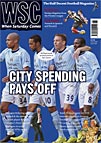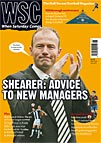 Dear WSC
Dear WSC
AFC Wimbledon fan Aled Thomas (Letters, WSC 267) bemoans people not knowing what to call his club. He would have enjoyed this exchange on Talksport on a recent Saturday when they decided to venture south of the Premier League, for a change. Ian Danter: “AFC Wimbledon could gain promotion to the Conference today.” Micky Quinn: “Is that the original club?” Danter (hesitantly): “Yes.” Quinn: “Do they still play at Plough Lane?” Why so knowledgeable?
Glyn Berrington, Brierley Hill
Search: ' Conference North'
Stories
 On the 25th anniversary of the start of the national miners’ strike, Jon Spurling looks at the industry’s long-established links with professional football that have since been swept away
On the 25th anniversary of the start of the national miners’ strike, Jon Spurling looks at the industry’s long-established links with professional football that have since been swept away
Twenty-five years ago football and coal mining had in common the fact that Margaret Thatcher clearly didn’t see a long-term future for either within British society. In 1985, a Socialist Worker article drew parallels between the 1984 “Battle of Orgreave”, where around 10,000 pickets squared up to as many police, with the violence at Kenilworth Road during a Luton v Millwall FA Cup tie in 1985: “The images of violence and of raging anger (although those witless football fans have no cause at all) lead us to question whether the fabric of society is close to collapse in Thatcher’s Britain.” Two years after the strike ended, at a time when the minister for sport Colin Moynihan mooted the idea of a compulsory membership scheme to curb hooliganism, a letter to the Guardian expressed a fear that “a high handed government, with sheer contempt for the working classes, is, if one looks at recent events, attempting to utterly destroy two bastions of working class Britain.” To take the comparison to its conclusion, both industries had been irrevocably altered by the late 1980s. In the wake of the Taylor Report into the Hillsborough disaster, and Italia 90, football would become gentrified, and machines replaced workers as colliery closures continued apace. “The working class’s links with both football and mining were, directly or indirectly, rightly or wrongly, severed by Thatcher’s government,” remarked former Labour MP Roy Hattersley in 1992.
 Harry Pearson ponders whether there really is a collective football sensibility in the north-east and concludes that there probably isn’t
Harry Pearson ponders whether there really is a collective football sensibility in the north-east and concludes that there probably isn’t
A dozen or so years ago I was sitting on a plane at Brussels airport. Our departure had been slightly delayed to allow passengers from a connecting flight to join us. Eventually they arrived and marched down the aisle to the rear of standard class, an elderly couple trailing the scent of sun tan oil and eau de cologne. Nothing unusual in that except that on closer inspection the pair turned out to be Newcastle United chairman Sir John Hall and his wife, Lady May.
 With the Conference giving varying punishments to different clubs, fans are understandably unsure as to the reasoning behind their decisions. Matthew Gooding reports
With the Conference giving varying punishments to different clubs, fans are understandably unsure as to the reasoning behind their decisions. Matthew Gooding reports
Another season is reaching its climax, and the fate of football clubs up and down the country is slowly becoming clearer. But in the Conference, such trivial matters as final league position are often irrelevant when it comes to determining issues of demotion and promotion. For this is a division that has seen at least one club relegated for non-footballing reasons in each of the past three seasons, with Canvey Island and Boston suffering demotions, and Halifax and Scarborough going out of business all together and re-forming further down the pyramid.
 While their footballing principles may stop West Brom repeating 2005’s great escape from relegation, their fans remain steadfastly positive. The visit of the unpopular yet enduringly effective Bolton provides another opportunity to showcase their faith and fragility, and David Stubbs was there
While their footballing principles may stop West Brom repeating 2005’s great escape from relegation, their fans remain steadfastly positive. The visit of the unpopular yet enduringly effective Bolton provides another opportunity to showcase their faith and fragility, and David Stubbs was there
As the West Brom fans enter by the Jeff Astle gate into The Hawthorns, many of them, young and old, male and female, pay tribute to painted images, fastened to the railings, of the hero of 1968’s FA Cup victory that look like they were commissioned by the same artist who does those mirror likenesses of Elvis Presley you get at fairgrounds. One by one, they come up and pat Astle, as if rubbing a rabbit’s paw for good luck. It’s a genuinely moving collective gesture of footballing faith – I’m reminded of the stream of newlyweds who come and pay tribute to the eternal flame dedicated to the Second World War fallen in Moscow’s Red Square.